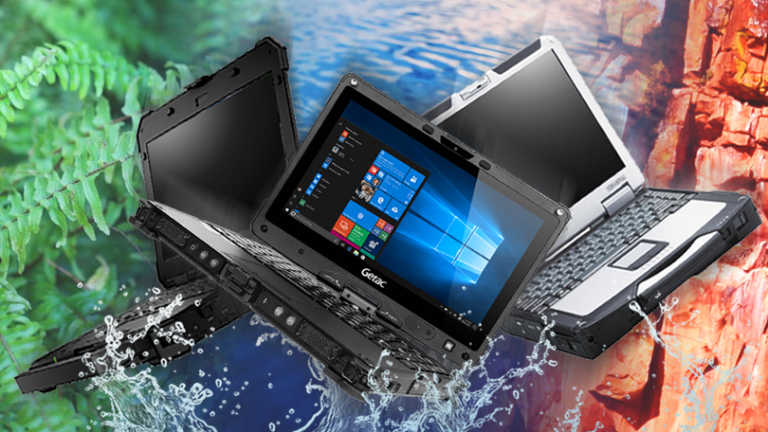In industries where durability and reliability can mean the difference between success and costly downtime, rugged laptops have become indispensable tools. Unlike traditional consumer-grade devices, rugged laptops are engineered to perform in the harshest conditions — from construction sites and military bases to field research stations and emergency response units. These machines combine cutting-edge technology with uncompromising toughness, ensuring uninterrupted performance no matter where the job takes you.
1. What Defines a Rugged Laptop
A rugged laptop isn’t simply a reinforced version of a standard notebook. It’s a purpose-built computing solution designed to survive extremes in temperature, moisture, dust, vibration, and impact. Every element — from the chassis to the internal components — is optimized for endurance and reliability.
Most rugged laptops undergo rigorous military-grade (MIL-STD-810G or MIL-STD-810H) testing, confirming their ability to withstand drops, shocks, and environmental stress. They are also rated for ingress protection (IP), which certifies resistance against water and dust. For field workers, this means a device that can endure the unpredictable — from rainstorms to desert heat — without missing a beat.
2. Reliability in Mission-Critical Professions
For professionals in sectors such as construction, oil and gas, utilities, public safety, logistics, and defense, reliability is non-negotiable. Downtime or data loss can have serious operational and financial consequences. Rugged laptops ensure mission continuity by offering robust hardware protection and dependable computing performance.
Emergency responders rely on them for real-time communication and data access during crises. Military personnel use them in deployment zones where exposure to dust, humidity, or extreme cold is unavoidable. Even in remote locations with unstable power sources, rugged laptops are built to last, maintaining data integrity and operational efficiency.
3. Performance Without Compromise
Durability doesn’t come at the cost of performance. Today’s rugged laptops feature advanced processors, generous RAM, and high-speed SSDs that rival — and often surpass — traditional business-class laptops.
These systems support demanding applications such as CAD software, GIS mapping, field data collection, and video analysis. Bright, sunlight-readable displays and glove-compatible touchscreens enhance usability in outdoor environments. Additionally, long battery life and hot-swappable battery options ensure that productivity continues even when power outlets are unavailable.
In short, rugged laptops provide enterprise-level computing power with the added assurance of field-ready resilience.
4. Connectivity and Security for the Modern Workforce
Modern field operations depend on seamless connectivity and data and data protection. Rugged laptops are equipped with advanced communication technologies, including 4G/5G capability, GPS, Bluetooth, and Wi-Fi 6, keeping teams connected even in remote areas.
Security features such as TPM modules, smart card readers, fingerprint scanners, and encrypted drives safeguard sensitive information — a critical advantage for defense, law enforcement, and government applications. For industries that manage confidential data, this level of protection is not optional; it’s essential.
5. Total Cost of Ownership (TCO) Advantage
At first glance, rugged laptops may seem like a higher investment compared to standard models. However, when factoring in their durability and lifespan, the long-term savings are significant. Consumer-grade devices often require frequent repairs or replacements when used in demanding conditions, leading to hidden costs in maintenance, downtime, and lost productivity.
Rugged laptops, by contrast, deliver years of dependable service. Their reduced failure rate, extended warranties, and low maintenance needs result in a lower total cost of ownership — making them a financially sound choice for organizations that value reliability.
6. Customization and Expandability
Rugged laptops also stand out for their customizability. Many models offer modular components or expansion bays that allow users to adapt the machine to their specific operational needs. Options may include additional ports, specialized connectivity modules, barcode scanners, or vehicle docking systems.
This flexibility makes rugged laptops suitable for a wide range of professional use cases — from warehouse management and fleet operations to field engineering and healthcare logistics. By choosing the right configuration, organizations can optimize workflow efficiency and tailor devices for maximum performance in the field.
7. Sustainability Through Durability
Sustainability is becoming an increasingly important consideration for technology buyers. Rugged laptops contribute to this goal by lasting longer and reducing electronic waste. Fewer replacements mean fewer discarded devices and a smaller environmental footprint. Many manufacturers also emphasize eco-conscious production methods and recyclable materials, aligning rugged technology with corporate sustainability initiatives.
Durability and environmental responsibility can go hand in hand — proving that toughness doesn’t have to come at the planet’s expense.
Conclusion
In today’s demanding professional environments, the right technology can define efficiency, safety, and success. Rugged laptops deliver the strength, performance, and reliability required for mission-critical operations — no matter how extreme the conditions. For businesses and professionals seeking dependable, field-ready computing solutions, Rugged Computing, Inc offers a range of advanced devices designed to perform where others fail. Built for resilience and engineered for excellence, they ensure that your work never stops, even when the environment pushes every limit.


